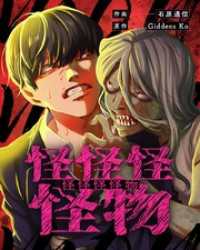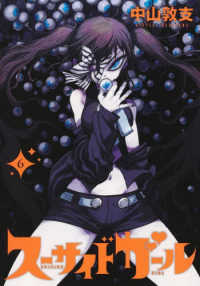- ホーム
- > 洋書
- > 英文書
- > Literary Criticism
Full Description
St Francis and Cultural Memory explores central aspects of English national, spiritual, and broader cultural identity through a detailed yet accessible analysis of a familiar figure: the Franciscan Friar. Covering more than four hundred years from the late fourteenth to the late eighteenth centuries, and taking in a wide variety of different literary and artistic forms, the book charts the changing face of the Franciscan friar in the English literary imagination, and examines how developments within this evolving tradition were both shaped by, and have helped to shape, wider debates within English culture about the relationship between religious and national identity, and the past and the present.
Central to this analysis is the notion of cultural memory. At the time of its suppression in the 1530s, the Franciscan Order was too deeply assimilated into the social fabric of England either to be forgotten, or to be credibly labelled an entirely alien presence, despite the best efforts of Protestant polemicists to do so. Rather, the effect of the Reformation was to supress, but not completely to erase, memories of English Franciscans. The Catholic history that English Protestantism sought to deny was prone to return in unexpected and often distorted and disturbing forms, so that in the centuries following the Reformation, Franciscans came to haunt the imagination of English writers and artists. Appearing in a wide variety of literary and artistic guises, these ghostly Franciscans functioned as spectres of a national past which English Protestantism tried to disavow, but which it was unable entirely to destroy.
Franciscan friars appear in the work of some of the most popular and influential writers and artists from the fourteenth to the eighteenth centuries, reflecting the centrality of the Order to ongoing debates within English culture about religion and national identity. The book discusses in detail the work of Geoffrey Chaucer, Thomas Malory, Thomas More, William Shakespeare, William Hogarth, Edward Gibbon, Ann Radcliffe, and Matthew Lewis. It explores the individual responses of these writers and artists to the Franciscans and their legacy, and also highlights the ways in which this shared interest in the Order reveals hitherto unacknowledged connections between their work.
Contents
Introduction: The Franciscans in Utopia
Chapter 1: King Richard III and the Lost World of the English Franciscans
Chapter 2: 'The Father of English Poetry': Catholicism, Nostalgia, and John Dryden's 'Vision of God's Plenty'
Chapter 3: Friar Huberd, Saint Francis, and the Observance of Gospel Perfection
Chapter 4: From Medieval to Early-Modern England: Sir Thomas Malory and William Shakespeare
Chapter 5: Shakespeare and the Franciscans
Chapter 6: William Hogarth's The Roast Beed of Old England and the Return of the Catholic Repressed
Chapter 7: 'He is in the habit of a Franciscan': Sir Francis Dashwood, Cosmopolitan anti-Catholicism, and the Gothic
Chapter 8: 'This demon in the garb of a monk': Ann Radcliffe, Matthew Lewis, and the Gothic Reception of Shakespeare's Franciscans
-

- 電子書籍
- 破滅のお姫様【タテヨミ】第80話 pi…
-

- 電子書籍
- 怪怪怪怪物3【タテヨミ】 POPTOO…






